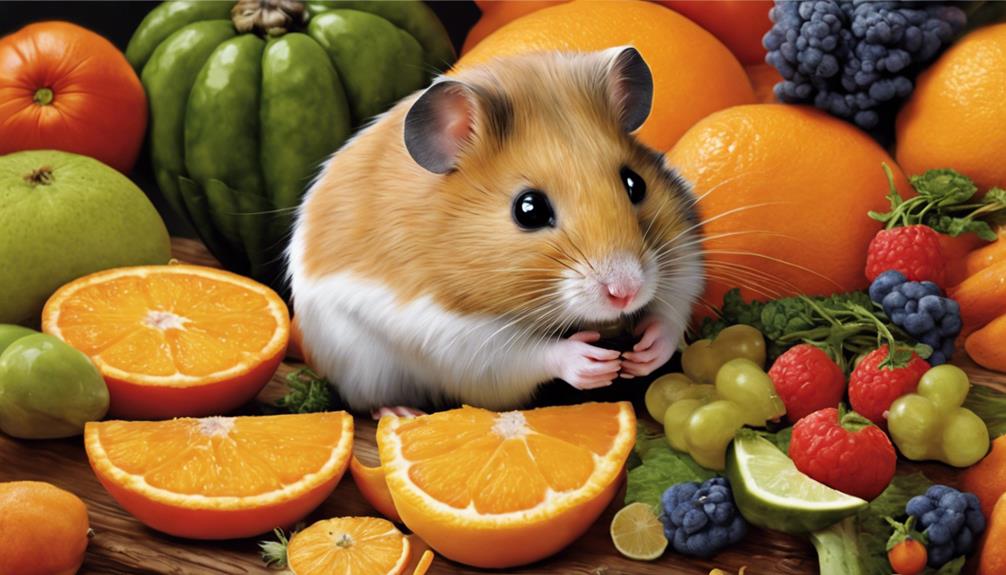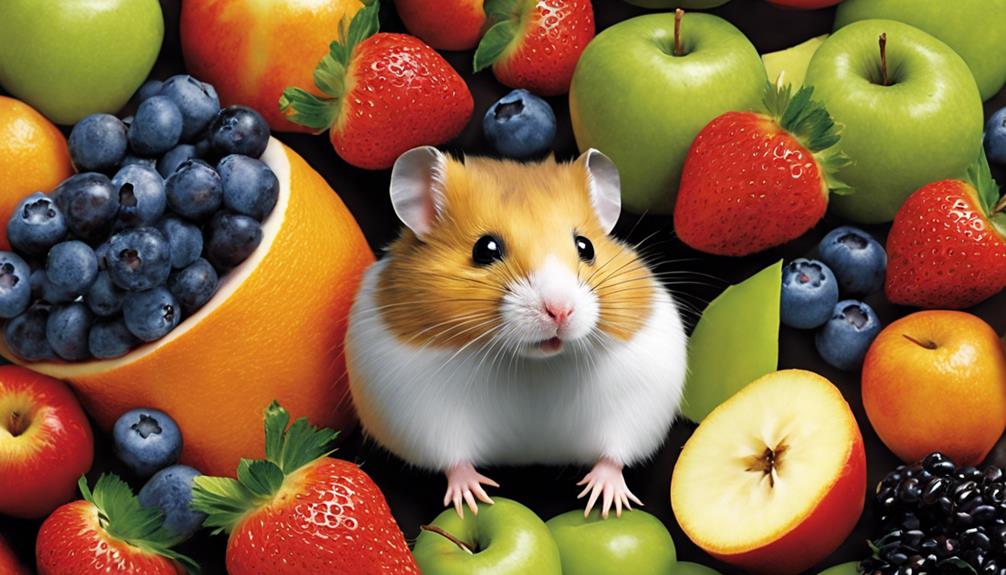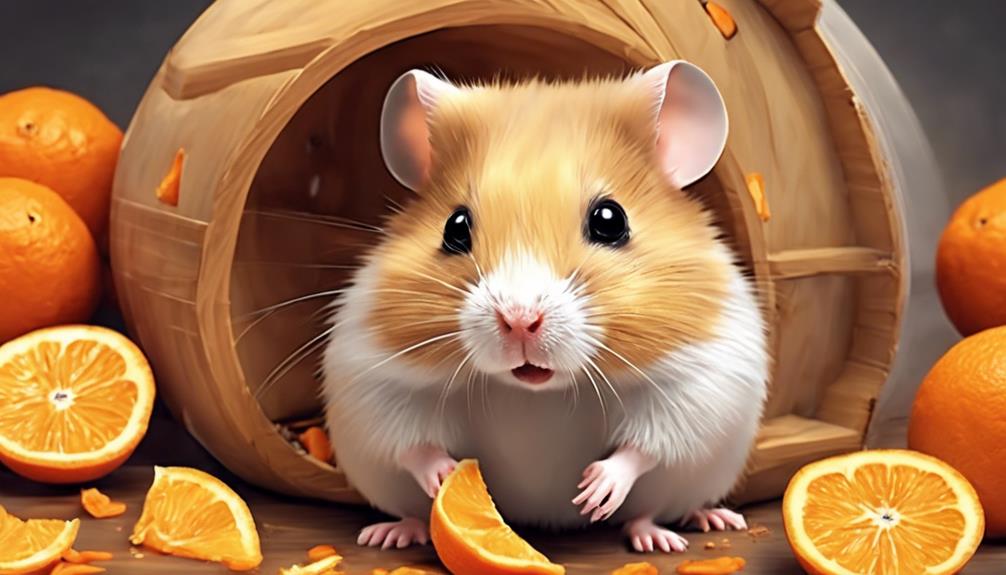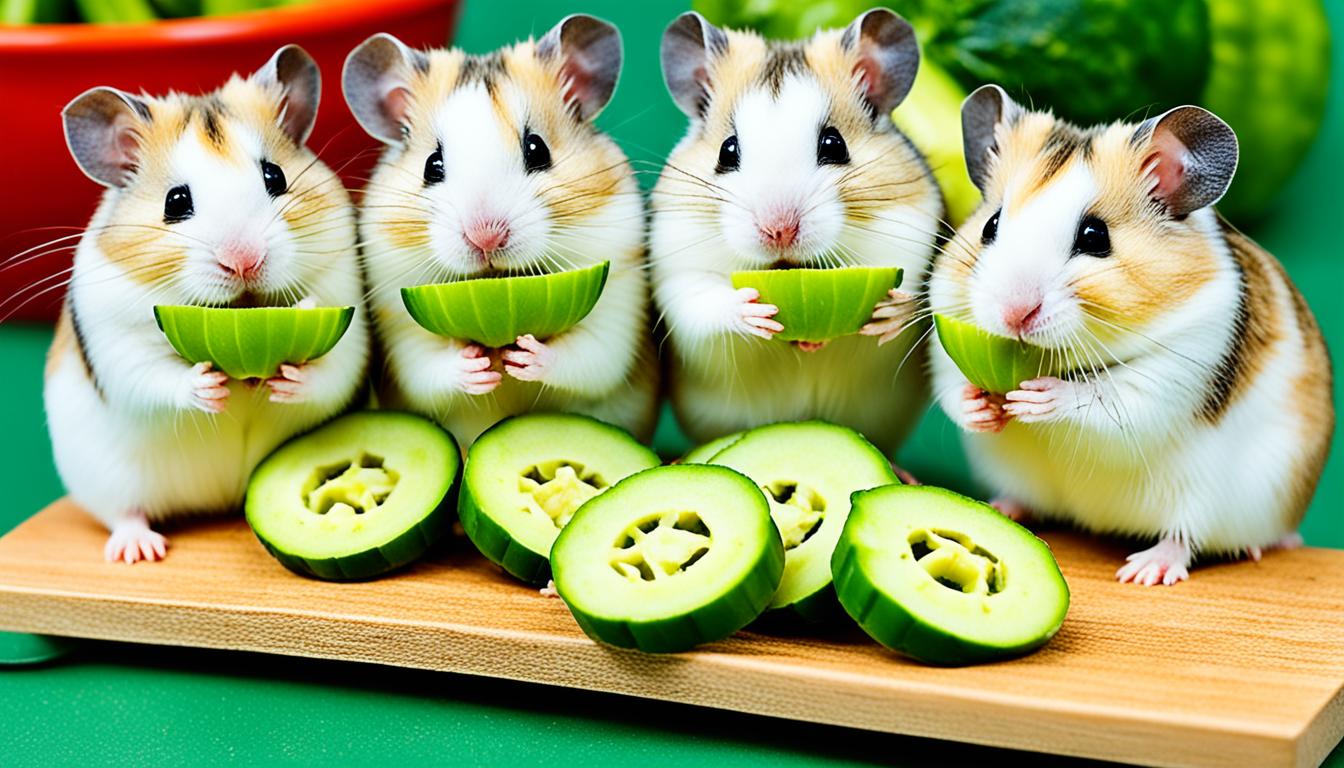When feeding hamsters oranges, it’s crucial to proceed with caution. Oranges are high in vitamin C, fiber, and other nutrients, which can be advantageous. However, the high acidity and sugar content can result in digestive issues and weight gain if given in excess. To safely provide oranges, offer them in small, seedless, and peel-free pieces only occasionally. Always prioritize fresh and clean fruit for your furry companions.
For more tips on hamster diet and alternatives to oranges, keep exploring!
Key Takeaways
- Offer small, seedless, and peeled pieces of oranges
- Remove uneaten portions promptly to prevent digestive issues
- Provide oranges as an occasional treat, not a regular meal
- Limit oranges to 3-4 times a week due to high acidity
- Ensure fresh water is available alongside orange treats
Benefits of Oranges for Hamsters
Oranges offer numerous health benefits for hamsters, making them a valuable addition to their diet. These fruits are packed with vitamin C, essential for supporting a hamster's immune system and overall health. Additionally, the soluble and insoluble fiber found in oranges aids in digestion, helping to prevent constipation in these small animals. Hamsters also benefit from the vitamin A in oranges, which promotes good eye health and guarantees they maintain excellent vision.
Furthermore, oranges provide vitamin B6, which plays a role in regulating blood pressure and supporting the hamster's well-being. While oranges offer these necessary nutrients, it's crucial to highlight that they've high acidity and sugar content, making them less ideal compared to other fruits. Moderation is key when feeding oranges to hamsters to avoid any potential digestive issues due to their acidic nature. By incorporating oranges into a balanced diet, hamsters can enjoy the nutritional advantages while maintaining good health.
Risks of Feeding Oranges to Hamsters

While oranges can provide certain nutrients, feeding them to hamsters poses significant risks that hamster owners should be aware of. Oranges are highly important, which can lead to digestive issues and even tooth erosion in hamsters. Additionally, the high sugar content in oranges can contribute to weight gain and obesity in these small pets. The potential risks of incorporating oranges into a hamster's diet outweigh any possible benefits they may offer. It is vital for hamster owners to prioritize their pets' health by being cautious about what they feed them.
| Risks of Feeding Oranges to Hamsters | |
|---|---|
| High Acidity | Can cause digestive issues and erode teeth. |
| High Sugar | Contributes to weight gain and obesity. |
| Digestive Issues | Upsets hamsters' stomachs. |
| Obesity | Puts hamsters at risk of health problems. |
Proper Way to Offer Oranges
When it comes to providing oranges to hamsters, guaranteeing the safety and well-being of your pet is crucial. Here are some tips on the proper way to offer oranges to your hamster:
- Provide a small piece: Offer a small piece of peeled orange without seeds or peel to prevent choking hazards and make it easier for your hamster to eat.
- Remove uneaten orange promptly: Remove any uneaten orange from the cage within a few hours to avoid spoilage and keep the cage clean.
- Limit treats: Limit orange treats to occasional and small amounts to prevent digestive issues and ensure a balanced diet for your hamster.
Frequency of Oranges in Hamster Diet

How frequently should hamsters be given oranges in their diet to maintain peak health and well-being?
When it comes to including oranges in a hamster's diet, moderation is important. Due to the high acidity levels in oranges, it's vital to offer them as an occasional treat rather than a regular part of their meals. Consuming oranges too frequently can lead to stomach upsets and potentially harm their digestive system.
To prevent health issues, it's recommended to provide oranges to hamsters three to four times a week. However, it's crucial to prioritize fresh and clean fruit over oranges to guarantee a balanced diet for your furry friend.
Alternatives to Oranges for Hamsters

Looking for suitable alternatives to oranges for your hamster's diet that provide essential nutrients without the acidity? When contemplating other options for oranges for your hamster, it's crucial to provide a balanced diet that meets their nutritional needs. Here are some safe choices to ponder:
- Apples: Apples are a fantastic option for hamsters. Be sure to eliminate the seeds as they can be harmful.
- Pears: Pears are another outstanding fruit choice for hamsters. They're juicy and supply essential vitamins.
- Berries: Berries such as strawberries, blueberries, and raspberries are safe for hamsters and offer antioxidants that can promote their health.
It is important to keep in mind that while fruits are safe for hamsters, they should be given in moderation due to their high sugar content. Always provide fresh water alongside any treats to keep your hamster hydrated. By offering a variety of fruits and vegetables, you can guarantee that your hamster has the best diet possible.
Frequently Asked Questions
Can I Feed My Hamster Oranges?
We don't recommend feeding hamsters oranges due to their high acidity, which can upset their stomach and cause dental problems. It's best to avoid oranges and consult a vet for a balanced diet plan.
What Are Hamsters Allowed to Eat?
Our experts understand the best for our furry friends! Hamsters flourish on a diverse diet of pellets, fresh veggies, fruits, and occasional treats like nuts or mealworms. Don't overlook the Timothy hay and always ensure that water bottle is full!
What Fruit and Veg Can Hamsters Eat Daily?
We offer our hamsters a range of safe fruits and vegetables every day, like apples, carrots, broccoli, and spinach. Fresh and cleaned produce guarantees they receive essential nutrients without causing imbalances. Diversity is vital for their health.
What Treats Can Hamsters Eat?
We can feed hamsters a variety of treats like fruits, vegetables, seeds, nuts, and mealworms. These treats provide essential nutrients and antioxidants. Moderation is key with protein sources like meat and cheese. Avoid sugary or salty foods for hamsters' health and well-being.
Are Oranges Safe for Hamsters to Eat?
Yes, you can safely offer treats to hamsters, and oranges are one of the safe options. Hamsters can eat oranges in small amounts as a treat, but it should not be a staple part of their diet. Too much citrus can upset their stomach, so it’s best to offer oranges sparingly.
Conclusion
To sum up, while oranges can be a nutritious treat for hamsters, moderation is crucial to avoid potential risks such as digestive issues.
Did you know that a hamster's diet should consist of about 10% fruits and vegetables?
Remember to consult with a veterinarian before introducing any new foods to your furry friend's diet to guarantee their health and well-being.
Happy feeding!










